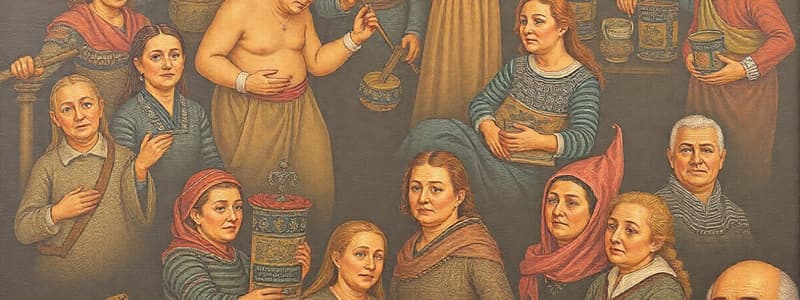Podcast
Questions and Answers
What does Cultural Materialism primarily examine?
What does Cultural Materialism primarily examine?
- The relationship between culture and material conditions (correct)
- The representation of gender in culture
- The dynamics of power and ideology
- The relationship between culture and language
What does Intersectionality recognize about identities?
What does Intersectionality recognize about identities?
- All identities are binary
- Identities are multifaceted and intersecting (correct)
- Identities cannot influence social status
- Identities are fixed and unchanging
Which research methodology combines both qualitative and quantitative approaches?
Which research methodology combines both qualitative and quantitative approaches?
- Case Studies
- Mixed Methods (correct)
- Critical Discourse Analysis
- Qualitative Research
Which critical analysis method focuses on how cultural texts reflect societal ideologies?
Which critical analysis method focuses on how cultural texts reflect societal ideologies?
What is a key aspect of Postcolonial Theory?
What is a key aspect of Postcolonial Theory?
Which research methodology is primarily centered on numerical data and surveys?
Which research methodology is primarily centered on numerical data and surveys?
What does Cultural Hybridity examine?
What does Cultural Hybridity examine?
What is the focus of Critical Discourse Analysis?
What is the focus of Critical Discourse Analysis?
What is the main goal of Cultural Critique?
What is the main goal of Cultural Critique?
Which theoretical framework examines class struggles and economic power in culture?
Which theoretical framework examines class struggles and economic power in culture?
Flashcards are hidden until you start studying
Study Notes
Theoretical Frameworks
Cultural Materialism: Examines the relationship between culture and material conditions (economics, environment).
Structuralism: Analyzes cultural phenomena through underlying structures (language, social norms).
Post-Structuralism: Questions the stability of meanings and explores language and power dynamics.
Marxist Critique: Focuses on class struggles, economic power, and ideology in culture.
Postcolonial Theory: Investigates the impacts of colonialism on cultures, identities, and power structures.
Feminist Theory: Analyzes cultural representations and gender relations, emphasizing inequalities.
Research Methodologies
Qualitative Research: Emphasizes understanding cultural phenomena through interviews, ethnography, and participant observation.
Quantitative Research: Utilizes surveys and statistical data to study cultural patterns and trends.
Mixed Methods: Combines qualitative and quantitative approaches for a comprehensive analysis.
Case Studies: In-depth examination of specific cultural instances or phenomena.
Critical Discourse Analysis: Explores how language shapes and is shaped by power relations within culture.
Cultural Identity
Social Identity Theory: Explains how individuals identify with groups, influencing self-perception and status.
Intersectionality: Recognizes that identities are multifaceted and intersecting (race, gender, class).
Cultural Hybridity: Examines the mixing of different cultural influences, leading to new, hybrid identities.
Globalization Effects: Explores how globalization influences local identities, promoting cultural exchange and sometimes conflict.
Representation & Visibility: Investigates how various identities are represented in media and society.
Critical Analysis
Textual Analysis: A method of deconstructing cultural products to understand meanings and implications.
Ideology Critique: Examines how cultural texts reflect and reinforce societal ideologies.
Cultural Critique: Challenges prevailing cultural norms and values, highlighting marginalized perspectives.
Framing Theory: Analyzes how issues are presented and perceived within cultural discourse.
Counter-Narratives: Focuses on voices and experiences often overlooked or suppressed in mainstream culture.
Interdisciplinary Approaches
Anthropology: Studies cultures through ethnographic methods, emphasizing social practices and meanings.
Sociology: Investigates cultural phenomena in relation to social structures and behaviors.
Media Studies: Analyzes the impact of media on culture and identity, including representation and consumption.
History: Looks at how cultural contexts shape historical narratives and vice versa.
Literary Studies: Explores cultural texts through literary theory, examining themes, symbols, and narratives.
Psychology: Examines the effects of cultural contexts on individual and group behavior and identity formation.
Theoretical Frameworks
Cultural Materialism: This theory examines how material conditions, such as economic systems and the environment, influence and shape cultures.
Structuralism: This framework analyzes cultural phenomena by identifying underlying structures, such as language and social norms, that govern how meaning is created.
Post-Structuralism: This approach questions the stability of meaning and explores how language and power dynamics create and challenge understanding within cultures.
Marxist Critique: This perspective analyzes culture through the lens of class struggles, economic power, and the role of ideology in shaping societal beliefs.
Postcolonial Theory: This field investigates the persistent impacts of colonialism on cultures, identities, and power structures in various societies.
Feminist Theory: This perspective analyzes cultural representations and gender relations, aiming to address and challenge inequalities faced by women and other marginalized genders.
Research Methodologies
Qualitative Research: This approach focuses on gaining in-depth understanding of cultural phenomena through methods like interviews, ethnographic studies, and participant observation.
Quantitative Research: This methodology utilizes surveys and statistical data to analyze cultural patterns and trends, often identifying measurable similarities and differences across groups.
Mixed Methods: This research approach combines both qualitative and quantitative methods to provide a comprehensive understanding of the cultural phenomena being studied.
Case Studies: This method involves in-depth examination of specific instances or phenomena within a culture, providing detailed insights into a particular situation.
Critical Discourse Analysis: This technique explores how language shapes and is shaped by power relations within a given culture, examining the interplay between communication and social structures.
Cultural Identity
Social Identity Theory: This theory explains how individuals identify with groups, which influences their self-perception, sense of belonging, and status within society.
Intersectionality: This concept acknowledges that identities are complex and multifaceted, intersecting across various categories such as race, gender, class, and sexual orientation.
Cultural Hybridity: This phenomenon describes the mixing of different cultural influences, leading to the creation of new, hybrid identities that reflect a blend of cultural backgrounds.
Globalization Effects: This area of study investigates how globalization influences local identities, leading to both cultural exchange and, at times, conflict as cultural differences interact.
Representation & Visibility: This topic explores how various identities are represented in media and society, examining issues of inclusion, exclusion, and the impact of representation on self-perception.
Critical Analysis
Textual Analysis: This method involves deconstructing cultural products, such as texts, images, or performances, to understand their underlying meanings, implications, and hidden messages.
Ideology Critique: This approach analyzes how cultural texts reflect, reinforce, and sometimes challenge prevailing societal ideologies, uncovering how beliefs and values are embedded within cultural products.
Cultural Critique: This practice challenges dominant cultural norms and values, highlighting the perspectives of marginalized groups and offering alternative visions for a more equitable society.
Framing Theory: This theory examines how issues are presented and perceived within cultural discourse, highlighting the role of language and media in shaping public understanding and responses.
Counter-Narratives: This approach focuses on the voices and experiences of individuals and groups that have been overlooked or suppressed in mainstream culture, providing alternative perspectives and challenging dominant narratives.
Interdisciplinary Approaches
Anthropology: This field studies diverse cultures through ethnographic methods, focusing on understanding social practices, beliefs, and the meanings that people assign to their experiences.
Sociology: This discipline investigates cultural phenomena in relation to social structures, including the interplay between social institutions, social groups, and individual behavior within a culture.
Media Studies: This field analyzes the impact of media on culture and identity, examining the role of different media forms in shaping representations, influencing values, and fostering cultural consumption.
History: This discipline considers how cultural contexts shape historical narratives and how historical events and developments influence cultural values, beliefs, and practices over time.
Literary Studies: This field examines cultural texts through the lens of literary theory, analyzing themes, symbols, narrative structures, and literary devices to understand the deeper meanings and cultural implications of texts.
Psychology: This discipline explores how cultural contexts influence individual and group behavior, including identity formation, socialization, and the development of cultural norms and values.
Studying That Suits You
Use AI to generate personalized quizzes and flashcards to suit your learning preferences.




